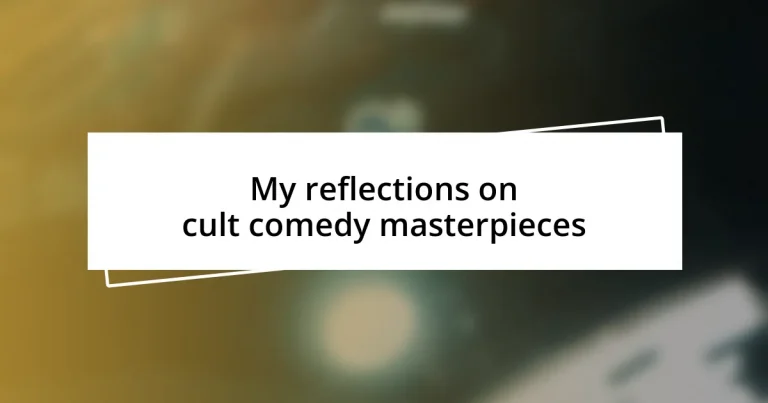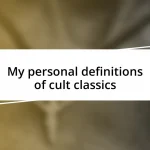Key takeaways:
- Cult comedies blend unconventional humor with relatable absurdity, creating unique experiences that foster community among fans.
- Key elements include strong aesthetic choices, eccentric characters, and a loyal fanbase that celebrates and quotes the films.
- These films challenge societal norms and can offer a sense of belonging, often resonating more profoundly over time as audience experiences change.
- Shared viewings of cult comedies enrich friendships, turning humor into traditions and memorable moments.
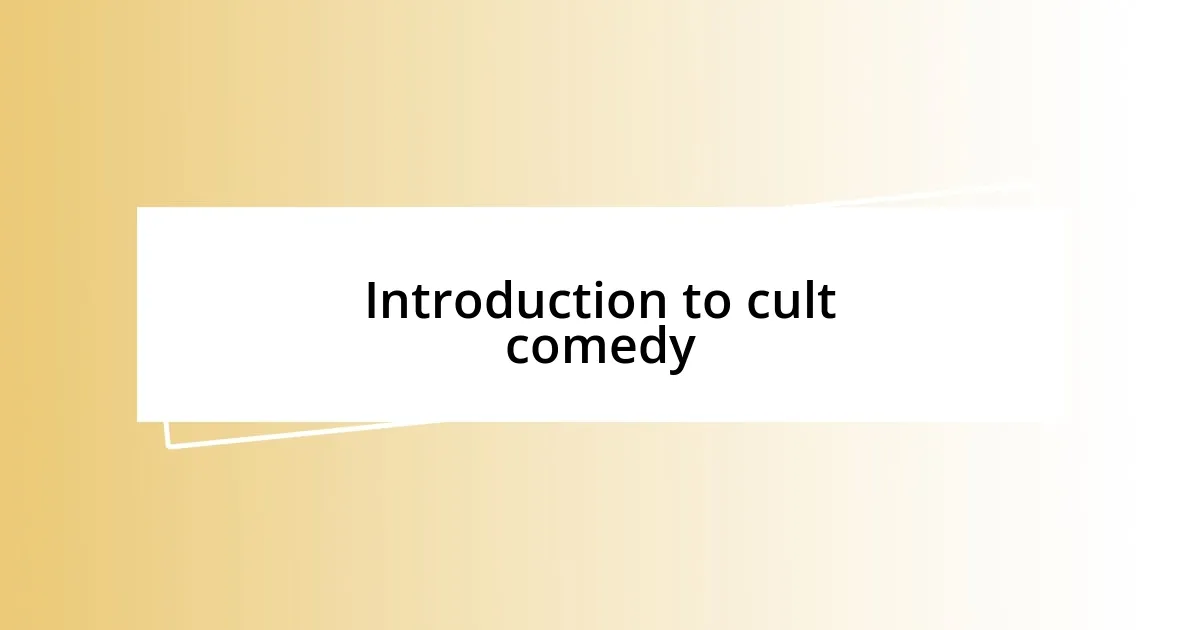
Introduction to cult comedy
Cult comedy is more than just a genre; it’s a unique blend of humor that speaks to the soul of those who discover it. I remember the first time I stumbled upon “The Big Lebowski.” It felt like finding a hidden gem, something others overlooked but that resonated deeply with me. I couldn’t help but wonder, what is that special spark that makes certain comedies resonate so strongly with specific audiences?
These films often feature unconventional narratives and offbeat characters, leaving a lasting impact on viewers. For instance, watching “Napoleon Dynamite” for the first time was a revelatory experience; I found myself laughing not just at the jokes, but at the bizarre, quirky situations that felt so relatable in their absurdity. Have you ever laughed at something that seemed ridiculous to others but made perfect sense in your world? That’s the beauty of cult comedies—they create their own universe where the rules of comedy can be rewritten.
Furthermore, the passion of the fanbase surrounding these films is astonishing. There’s a sense of belonging that comes with enjoying a film deemed “cult.” I’ve been in conversations where quoting a line from “Monty Python and the Holy Grail” sparked instant camaraderie among strangers. It’s interesting to think about why we are drawn to these seemingly niche comedies—perhaps it’s the validation of our quirks or the shared laughter that connects us all.
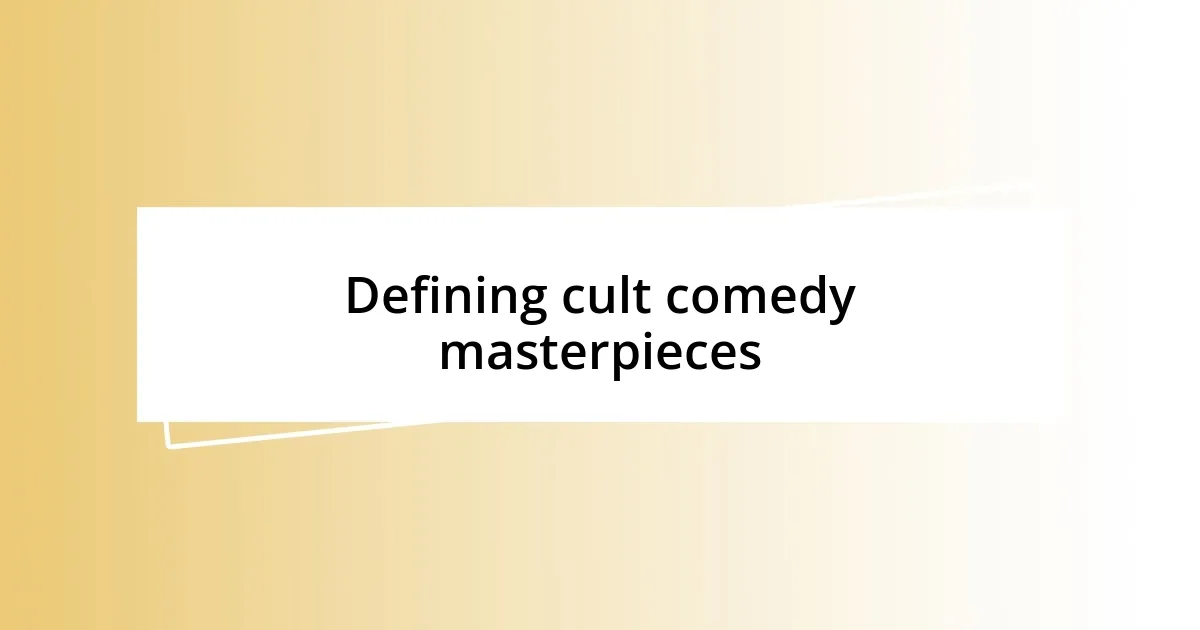
Defining cult comedy masterpieces
Cult comedy masterpieces are defined by their ability to challenge conventional humor and create a unique space for viewers to connect with the absurd. I remember laughing uncontrollably at “Shaun of the Dead,” not just because of the witty dialogues but due to how it blended horror and comedy so seamlessly. This fusion can turn ordinary situations into extraordinary experiences, allowing fans to revel in the unexpected.
In my experience, cult comedies often thrive on eccentric characters and unconventional plots, inviting audiences into a world where typical humor does not apply. Take “Withnail and I” as an example; its offbeat storytelling and memorable one-liners had me laughing out loud, though I felt I was part of an exclusive club that understood the film’s charm. It’s like wading into a rich cultural pool where only those who share the same comedic sensibility are invited.
Moreover, these films tend to gain momentum over time, often ignored at first but celebrated as time passes. For instance, when I first watched “Office Space,” I found a hilarious reimagining of the mundane. Now, years later, it resonates profoundly with anyone who has had a frustrating day at work relatable to our contemporary lives. Such films forge a deep connection with viewers, fostering a sense of community even among strangers.
| Characteristics | Examples |
|---|---|
| Unconventional Narratives | The Big Lebowski |
| Eccentric Characters | Napoleon Dynamite |
| Cult Following | Monty Python and the Holy Grail |
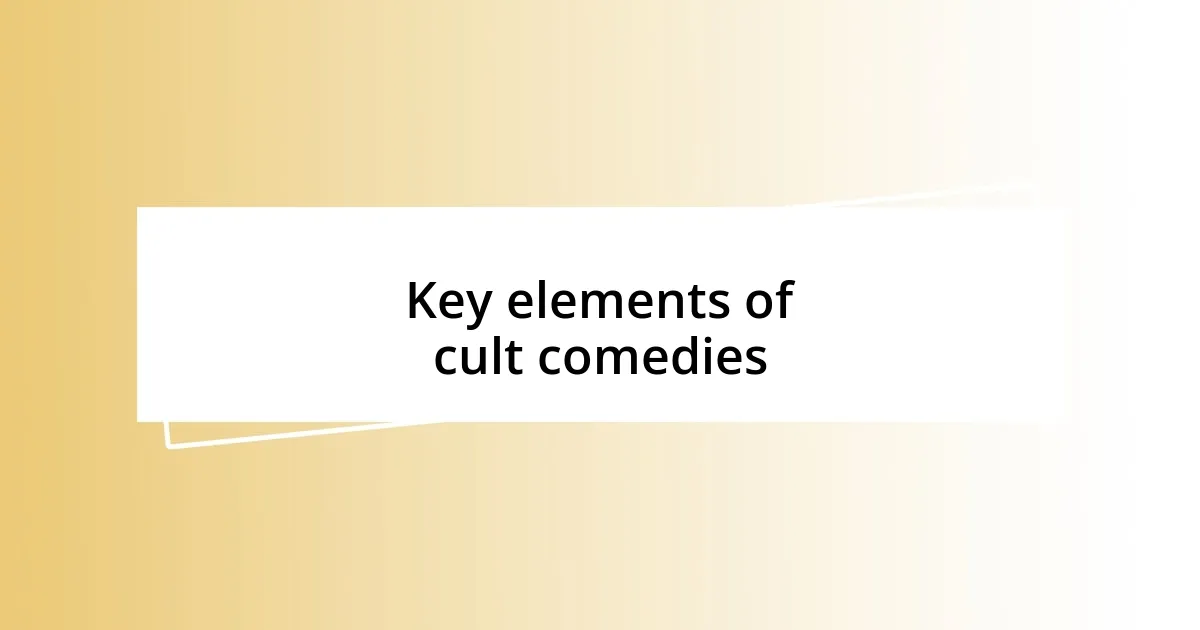
Key elements of cult comedies
Cult comedies stand out due to their distinctive fusion of humor and unconventional storytelling. I often find myself reminiscing about my first encounter with “Heathers.” The dark humor blended with teenage angst felt so authentic that I couldn’t help but reflect on my own high school experiences, with laughs that were both cathartic and unsettling. This ability to mix laughter with genuine emotions is a hallmark of cult comedies, making the absurdities of life feel oddly relatable.
- Unconventional Humor: Challenge mainstream comedic standards, often leading to unexpected laughs.
- Relatable Absurdity: Showcase bizarre scenarios that resonate with audiences’ personal experiences.
- Strong Aesthetic Choices: Utilize unique visual styles and soundtracks that add depth to the narrative.
- Engaged Fanbase: Foster a loyal community that passionately discusses and quotes the film, giving it a life beyond the screen.
In my practice, it’s clear that cult comedies thrive on the peculiar characters that embody the quirks we often hide. For example, when I watched “Clerks,” I couldn’t help but laugh at Dante’s and Randall’s mundane yet absurd conversations. They reminded me of my late-night discussions with friends—filled with existential questions and random topics that felt like life and death at the moment. Embracing these eccentricities helps viewers forge a deeper connection with the film and each other.
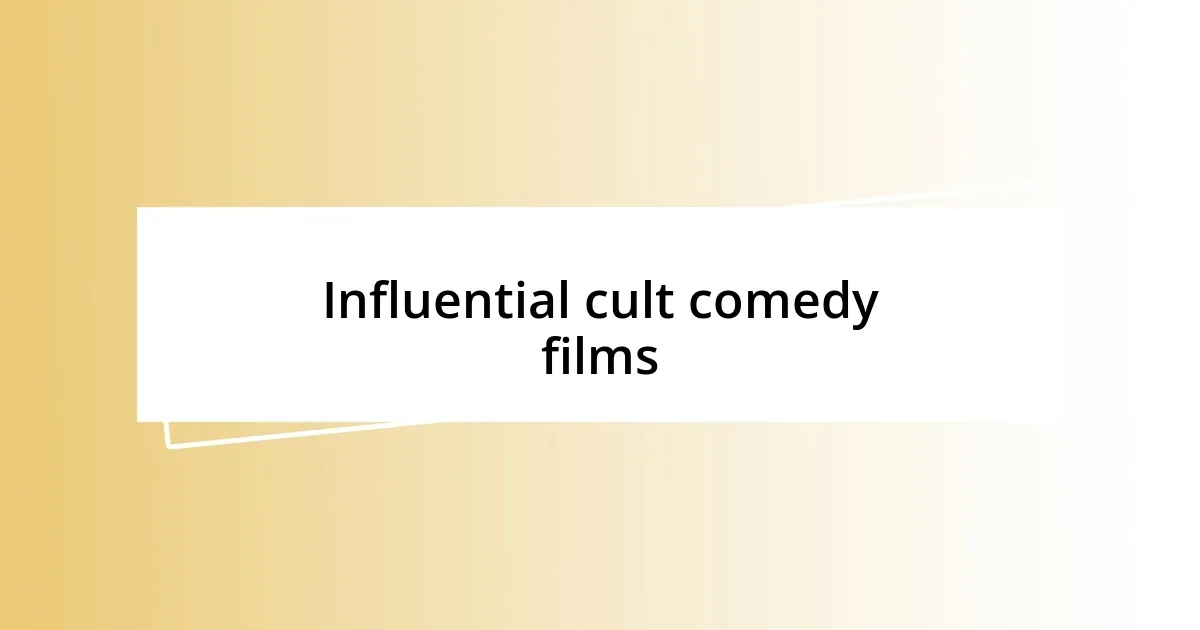
Influential cult comedy films
Some influential cult comedies have left an indelible mark on the genre, showcasing how absurdity can connect with real emotions. When I first saw “The Big Lebowski,” I was struck by its surreal plot twists and memorable characters like The Dude. The film’s laid-back vibe was reflective of a generation looking for meaning in a chaotic world, and I still find myself quoting it in everyday conversations—who doesn’t love the iconic line about life just being too short to not take it easy?
Then there’s “Napoleon Dynamite,” with its quirky charm and offbeat humor. I remember watching it at a friend’s house, feeling a strange sense of camaraderie with Napoleon’s awkwardness and desire to fit in. The film taps into the highs and lows of adolescence, reminding us that being weird isn’t just acceptable; it’s often where the humor—and the heart—lies. Have you ever felt out of place but found solace in a niche community? That’s the essence of “Dynamite,” encapsulating the challenges of being uniquely yourself.
Finally, take “Monty Python and the Holy Grail,” which redefined satire with its absurd take on a classic story. I distinctly remember laughing at the sheer ridiculousness of the knights and their quests; it made me realize that comedy doesn’t always have to be sophisticated to be impactful. Watching it felt like being part of an inside joke with friends, eagerly anticipating the next punchline. Cult comedies like this one remind us that laughter often thrives in the unexpected, creating bonds that last long after the credits roll.
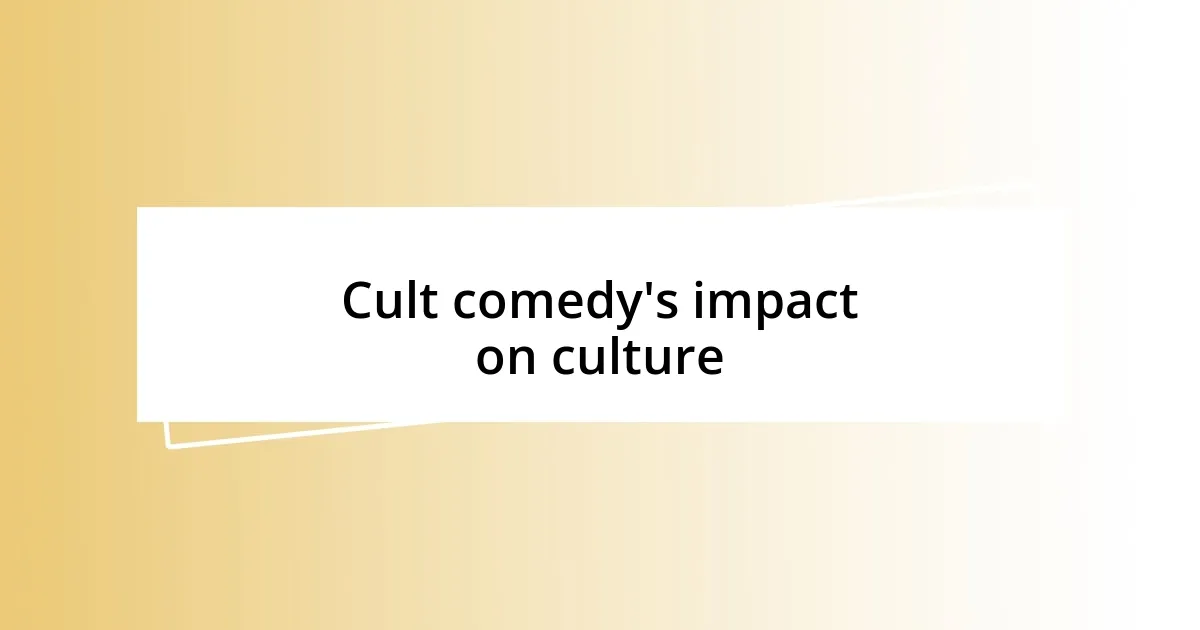
Cult comedy’s impact on culture
Cult comedies have a fascinating way of shaping cultural conversations and challenging societal norms. I remember first watching “The Office,” and I couldn’t believe how the characters’ awkward, mundane interactions mirrored my own office experiences. It made me realize that humor could be a powerful tool to critique workplace culture—transforming something seemingly boring into a relatable tapestry of laughs and insight.
What really struck me was how these films create communities around shared laughter. For instance, “The Room,” with its famously terrible performances, became a cult classic precisely because of its imperfections. I attended a midnight screening once, and the energy of the audience, filled with fans shouting lines and throwing spoons, was electrifying. That experience taught me that cult comedies not only entertain but also foster connections among people—turning laughter into a communal experience that can be both cathartic and unforgettable.
Moreover, the quotable nature of cult comedies seeps into everyday life, influencing how we express ourselves. I often find myself peppering my conversations with quotes from “Superbad”—lines that can instantly lighten the mood. It’s interesting to consider how these films encourage us to embrace our own quirks, making it okay to be goofy and unabashedly ourselves. Have you ever noticed how a simple catchphrase can remind you of a cherished moment with friends? That’s the magic of cult comedy—it embeds itself into our lives, shaping our identities and connections in profound ways.
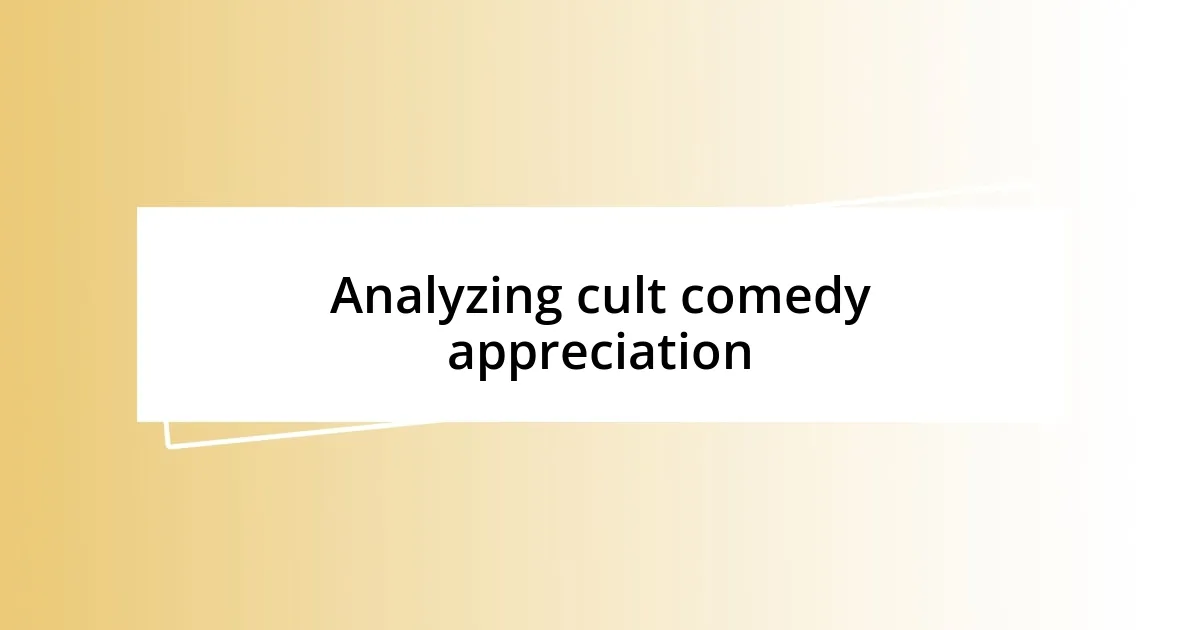
Analyzing cult comedy appreciation
Cult comedy appreciation is an intriguing phenomenon that often blurs the lines between humor and human experience. I remember watching “Shaun of the Dead” for the first time; the blend of horror and comedy was unlike anything I had seen before. It made me reflect on how laughter can exist even in our darkest moments, making the absurdity of life a little more bearable. Can humor be a survival mechanism? I certainly think so.
What keeps audiences coming back to these films is the sense of familiarity and shared experience, which is often cultivated through word-of-mouth. I vividly recall discussing “Clerks” over coffee with a group of friends who loved its irreverent take on everyday life. We bonded over our shared admiration for the film’s realness, our laughter echoing stories of our own mundane experiences. It felt like discovering a secret club where the initiation was simply finding joy in the ordinary—a reminder of how relatable these narratives can be.
The appreciation for cult comedies often grows with repeated viewings, turning jokes into cherished memories. I cherish the late-night viewings of “Parks and Recreation,” where I can recite Ron Swanson’s deadpan lines alongside my friends. It’s fascinating how these shared moments of viewing turn into traditions, weaving humor into the fabric of our friendships. Have you ever noticed how a movie can capture a specific time in your life, making you laugh every time you revisit it? That’s the beauty of cult comedies—they become part of our story.
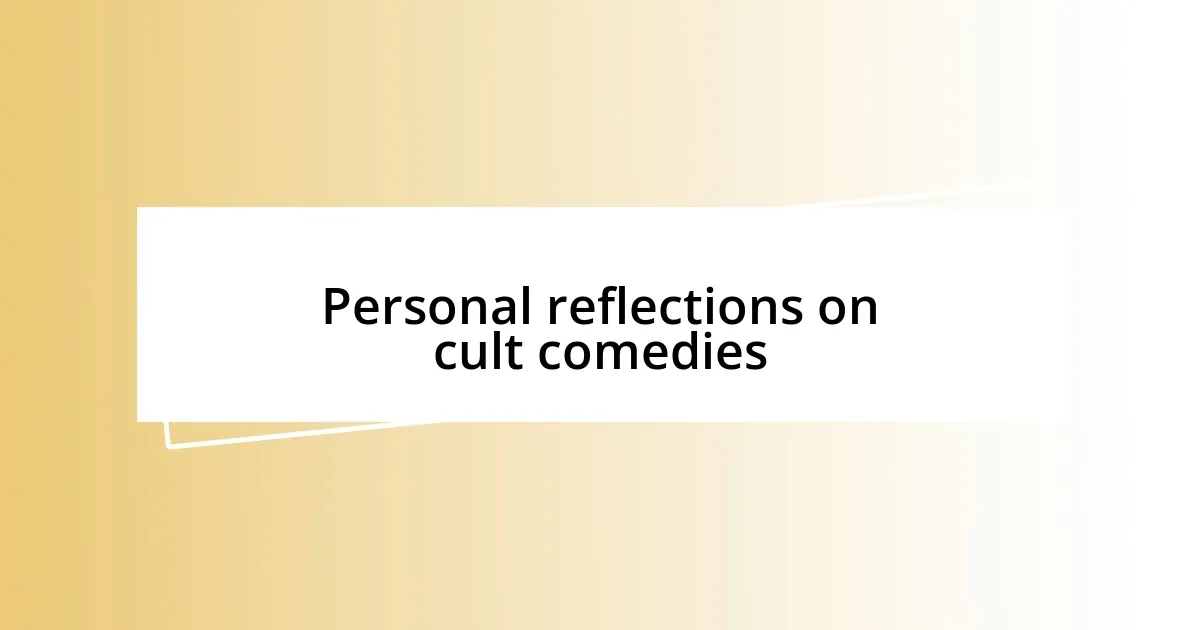
Personal reflections on cult comedies
Reflecting on cult comedies always brings me back to the outrageous humor of “Napoleon Dynamite.” I still remember my friend and I quoting, “Gosh!” while trying to navigate our awkward high school years. It was a surreal experience to find ourselves laughing at a character who seemed just as out of place as we felt. That film perfectly captures that universal sensation of being a misfit and embracing your quirks, doesn’t it?
I often think about how the absurdity within these comedies, like “Office Space,” resonates with the pressures we all face in our daily lives. When I first watched it, I couldn’t help but relate to the feeling of disillusionment many of us experience in the rat race. The infamous scene with the printer made me burst into laughter, yet it also struck a chord—an oddly cathartic release for those frustrations. Have you ever had a moment where humor made you reflect on something deeper?
Moreover, my experience with “Wet Hot American Summer” was a revelation in how parody can elevate humor into an art form. Watching it with friends during a laid-back summer night, we found ourselves laughing harder at the over-the-top characters and scenarios than at anything else we’d seen. It felt like this film understood and amplified our youth, turning nostalgia into comedy gold. Isn’t it interesting how these films hook us, creating a mix of laughter and fond memories that linger even long after the credits roll? That blend is what draws me into the world of cult comedies time and again.






